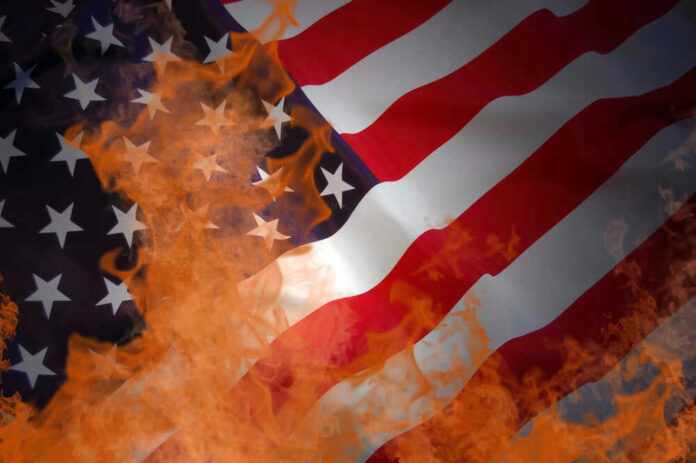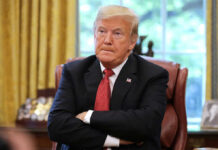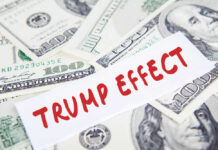
President Donald Trump’s new executive order targets flag burning with tough prosecution and immigration penalties, igniting fierce debate over patriotism and constitutional rights.
Story Snapshot
- President Trump signed an executive order, directing aggressive prosecution of flag desecration under existing laws.
- The order imposes immigration consequences on foreign nationals involved in flag burning, including denial of benefits and potential deportation.
- The action challenges Supreme Court precedent protecting flag burning as free speech, setting up likely legal battles.
- Supporters hail the move as defending national symbols, while critics warn of government overreach and threats to First Amendment rights.
Trump Directs Crackdown on Flag Desecration, Citing National Respect
President Trump signed an executive order instructing the Attorney General to prioritize the prosecution of individuals who burn or desecrate the American flag.
The order was announced in the Oval Office, where Trump declared that acts of flag desecration are uniquely provocative and a direct threat to public safety.
The order does not create new federal crimes but compels the Justice Department to aggressively enforce existing statutes and pursue litigation to clarify exceptions to First Amendment protections. The president’s move comes as many Americans express concern about increasing disrespect toward national symbols and traditions.
President Trump’s directive goes further by instructing federal agencies to deny immigration benefits to foreign nationals who participate in flag desecration.
Under the order, the Secretaries of State and Homeland Security must coordinate enforcement to ensure that non-citizens found guilty of such acts are subject to visa denials or deportation.
Trump emphasized in public remarks that, “If you burn a flag, you get one year in jail, no early exits, no nothing,” signaling a zero-tolerance stance on violations.
The order also directs cases to be referred to state and local authorities when appropriate, aiming to maximize enforcement at every level of government.
Executive Order Challenges Longstanding Supreme Court Precedent
The new measure directly challenges Supreme Court precedents set by Texas v. Johnson (1989) and United States v. Eichman (1990), which established that flag desecration is protected speech under the First Amendment.
Legal scholars and civil liberties organizations note that the executive order’s impact will hinge on the courts’ willingness to revisit or reinterpret these decisions.
The Justice Department is now tasked with both prosecuting cases under existing laws and pursuing litigation to clarify the limits of free speech as they apply to flag burning.
While some assert that the president is restoring dignity to national symbols, others argue the order risks government overreach and the erosion of constitutional rights.
Supporters of the order, including prominent conservative commentators and patriotic organizations, contend that strong action is overdue to restore respect for the flag and deter provocative protests.
They argue that the American flag represents unity and sacrifice, and that desecration undermines the nation’s core values and the sacrifices made by generations of Americans.
Opponents, such as the ACLU and other civil liberties groups, warn that the order could have a chilling effect on free speech and protest. They maintain that any attempt to criminalize political dissent, even in symbolic form, threatens the fundamental liberties enshrined in the Constitution.
Immigration Penalties Raise New Stakes for Foreign Nationals
By tying immigration penalties to acts of flag desecration, the order expands its reach beyond citizens to non-citizens residing in or seeking entry to the United States.
The Justice Department and Department of Homeland Security are expected to increase scrutiny of visa applicants and residents accused of or convicted of flag burning.
Immigration law experts caution that this policy could result in more deportations and visa denials, particularly for activists and protesters who are not U.S. citizens.
These measures add a new layer of enforcement that goes well beyond previous attempts to limit or punish flag desecration, broadening the executive branch’s authority in matters of national symbolism and immigration.
Critics of the immigration provisions argue that the policy sets a dangerous precedent by linking political expression to immigration status.
They contend that punishing foreign nationals for acts of protest, even deeply unpopular ones, erodes due process and expands government power in ways that may not withstand judicial scrutiny.
Supporters counter that such measures are necessary to ensure that those who benefit from America’s freedoms also respect its core symbols.
Legal Showdown and National Debate Expected
The executive order’s immediate effect is to increase prosecutions for flag desecration and introduce immigration consequences for non-citizens. Legal experts anticipate a wave of litigation, with constitutional challenges likely to reach the Supreme Court.
The order has already sparked vigorous debate, mobilizing both supporters who see it as a long-overdue defense of American values and critics who warn of grave threats to free speech.
The Justice Department’s approach and the judiciary’s ultimate rulings will determine the policy’s long-term impact on the First Amendment, immigration, and the boundaries of executive authority.
Trump Directs AG to Prosecute Flag Desecration https://t.co/e0xggMtJdq arrest and deport foreigners who do it as well
— Sherry L (@mountainmama50) August 26, 2025
As the nation watches the unfolding legal and political battle, the core question remains: can the government punish acts of protest involving the American flag without undermining the very freedoms it seeks to protect?
For now, the executive order stands as one of the most aggressive federal efforts in decades to deter flag desecration and assert a renewed commitment to national symbols. Still, its fate will be decided in the courts and the court of public opinion.
Sources:
Trump flag burning executive order (Axios, Aug 25, 2025)
Trump admin live updates (ABC News)
Prosecuting Burning of the American Flag (White House Presidential Actions)
Trump crack down on flag burning desecration executive order (Fox News)



















